World Geography And Politics Daily News | 22 May 2023

Views (220)
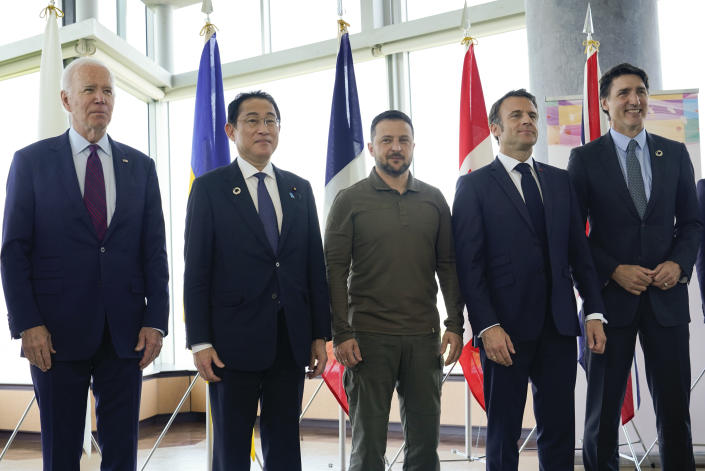
Zelenskyy denies Ukrainian city of Bakhmut occupied by Russian forces
Ukrainian President Volodymyr Zelenskyy said Sunday that Russian forces weren't occupying Bakhmut, casting doubt on Moscow's insistence that the eastern Ukrainian city had fallen. Responding to a reporter’s question about the status of the city at the Group of Seven summit in Japan, Zelenskyy said: “Bakhmut is not occupied by the Russian Federation as of today.”
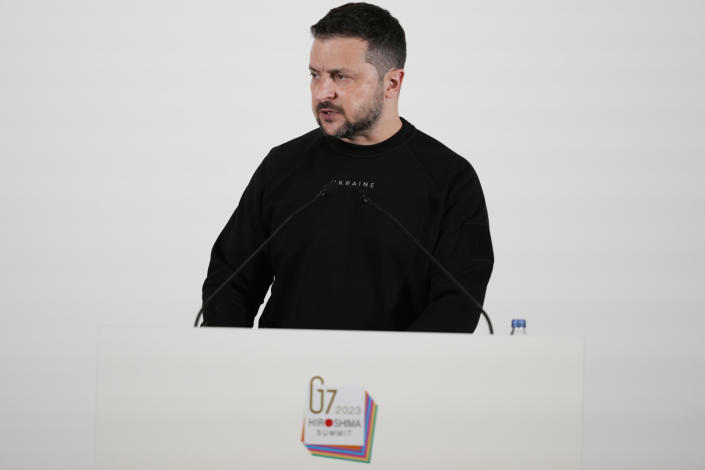
HIROSHIMA, Japan (AP) — Ukrainian President Volodymyr Zelenskyy said Sunday that Russian forces weren't occupying Bakhmut, casting doubt on Moscow's insistence that the eastern Ukrainian city had fallen.
Responding to a reporter’s question about the status of the city at the Group of Seven summit in Japan, Zelenskyy said: “Bakhmut is not occupied by the Russian Federation as of today.”
“We are not throwing people (away) to die," Zelenskyy said in Ukrainian through an interpreter. "People are the treasure. I clearly understand what is happening in Bakhmut. I cannot share with you the technical details of what is happening with our warriors.”
“The fight for the city of Bakhmut is continuing,” the Ukrainian military's general staff said in a statement on Sunday evening.
The fog of war made it impossible to confirm the situation on the ground in the invasion’s longest battle, and a series of comments from Ukrainian and Russian officials added confusion to the matter.
Zelenskyy’s response in English to a question earlier at the summit about the status of Bakhmut suggested that he believed the city had fallen to Russian forces, and he offered solemn words about its fate.
When asked if the city was in Ukraine’s hands, Zelenskyy said: “I think no, but you have to — to understand that there is nothing, They’ve destroyed everything. There are no buildings. It’s a pity. It’s tragedy.”
“But, for today, Bakhmut is only in our hearts. There is nothing on this place, so — just ground and — and a lot of dead Russians,” he said.
Zelenskyy’s press secretary later walked back those previous comments.
Ukrainian defense and military officials said that fierce fighting was ongoing. Deputy Defense Minister Hanna Malyar even went so far as to say that Ukrainian troops “took the city in a semi-encirclement.”
“The enemy failed to surround Bakhmut, and they lost part of the dominant heights around the city,” Malyar said. “That is, the advance of our troops in the suburbs along the flanks, which is still ongoing, greatly complicates the enemy’s presence in Bakhmut.”
And the spokesman for Ukraine’s Eastern Group of Forces, Serhii Cherevaty, said that the Ukrainian military is managing to hold positions in the vicinity of Bakhmut.
“The president correctly said that the city has, in fact, been razed to the ground. The enemy is being destroyed every day by massive artillery and aviation strikes, and our units report that the situation is extremely difficult.
"Our military keep fortifications and several premises in the southwestern part of the city. Heavy fighting is underway,” he said.
It was only the latest flip-flopping of the situation in Bakhmut after eight months of intense fighting.
Only hours earlier, Russian state new agencies reported that President Vladimir Putin congratulated “Wagner assault detachments, as well as all servicemen of the Russian Armed Forces units, who provided them with the necessary support and flank protection, on the completion of the operation to liberate Artyomovsk,” which is Bakhmut's Soviet-era name.
Russia's Defense Ministry also said that Wagner and military units “completed the liberation” of Bakhmut.
At the G-7 in Japan, Zelenskyy stood side by side with U.S. President Joe Biden during a news conference. Biden announced $375 million more in aid for Ukraine, which included more ammunition, artillery and vehicles.
“I thanked him for the significant financial assistance to (Ukraine) from (the U.S.),” Zelenskyy tweeted later.
The new pledge came after the U.S. agreed to allow training on American-made F-16 fighter jets, laying the groundwork for their eventual transfer to Ukraine. Biden said Sunday that Zelenskyy had given the U.S. a “flat assurance” that Ukraine wouldn't use the F-16s jets to attack Russian territory.
Many analysts say that even if Russia was victorious in Bakhmut, it was unlikely to turn the tide in the war.
The Russian capture of the last remaining ground in Bakhmut is “not tactically or operationally significant,” a Washington-based think tank said late Saturday. The Institute for the Study of War said that taking control of these areas “does not grant Russian forces operationally significant terrain to continue conducting offensive operations,” nor to “to defend against possible Ukrainian counterattacks.”
In a video posted on Telegram, Wagner head Yevgeny Prigozhin said the city came under complete Russian control at about midday Saturday. He spoke surrounded by about a half-dozen fighters, with ruined buildings in the background and explosions heard in the distance.
Russian forces still seek to seize the remaining part of the Donetsk region still under Ukrainian control, including several heavily fortified areas.
It isn't clear which side has paid a higher price in the battle for Bakhmut. Both Russia and Ukraine have endured losses believed to be in the thousands, though neither has disclosed casualty numbers.
Analysts have said Bakhmut’s fall would be a blow to Ukraine and give some tactical advantages to Russia but wouldn’t prove decisive to the outcome of the war.
Bakhmut, located about 55 kilometers (34 miles) north of the Russian-held regional capital of Donetsk, had a prewar population of 80,000 and was an important industrial center, surrounded by salt and gypsum mines.
The city, which was named Artyomovsk after a Bolshevik revolutionary when Ukraine was part of the Soviet Union, also was known for its sparkling wine production in underground caves. Its broad tree-lined avenues, lush parks and stately downtown with imposing late 19th-century mansions — all now reduced to a smoldering wasteland — made it a popular tourist destination.
When a separatist rebellion engulfed eastern Ukraine in 2014 weeks after Moscow’s illegal annexation of Ukraine’s Crimean Peninsula, the rebels quickly won control of the city, only to lose it a few months later.
After Russia switched its focus to the Donbas following a botched attempt to seize Kyiv early in the February 2022 invasion, Moscow’s troops tried to take Bakhmut in August but were pushed back.
The fighting there abated in autumn as Russia was confronted with Ukrainian counteroffensives in the east and the south, but it resumed at full pace late last year. In January, Russia captured the salt-mining town of Soledar, just north of Bakhmut, and closed in on the city’s suburbs.
Intense Russian shelling targeted the city and nearby villages as Moscow waged a three-sided assault to try to finish off the resistance in what Ukrainians called “fortress Bakhmut.”
Mercenaries from Wagner spearheaded the Russian offensive. Prigozhin tried to use the battle for the city to expand his clout amid the tensions with the top Russian military leaders whom he harshly criticized.
“We fought not only with the Ukrainian armed forces in Bakhmut. We fought the Russian bureaucracy, which threw sand in the wheels,” Prigozhin said in the video on Saturday.
The relentless Russian artillery bombardment left few buildings intact amid ferocious house-to-house battles. Wagner fighters “marched on the bodies of their own soldiers” according to Ukrainian officials. Both sides have spent ammunition at a rate unseen in any armed conflict for decades, firing thousands of rounds a day.
Russian Defense Minister Sergei Shoigu has said that seizing the city would allow Russia to press its offensive farther into the Donetsk region, one of the four Ukrainian provinces that Moscow illegally annexed in September.
___
Elise Morton reported from London, and Susie Blann from Kyiv, Ukraine. Elaine Kurtenbach and Adam Schreck contributed to this report from Hiroshima.
___
Peace, food and fertilizer: African leaders' challenge heading to talks with Moscow, Kyiv
A delegation of six African leaders set to hold talks with Kyiv and Moscow aim to “initiate a peace process," but also broach the thorny issue of how a heavily-sanctioned Russia can be paid for the fertilizer exports Africa desperately needs, a key mediator who helped broker the talks said in an interview with The Associated Press. Jean-Yves Ollivier, an international negotiator who has been working for six months to put the talks together, said the African leaders would also discuss the related issue of easing the passage of more grain shipments out of Ukraine amid the war and the possibility of more prisoner swaps when they travel to both countries on what they’ve characterized as a peace mission.
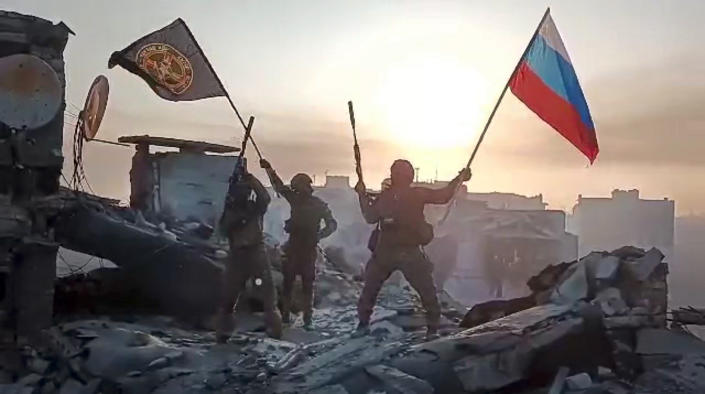
Jean-Yves Ollivier, an international negotiator who has been working for six months to put the talks together, said the African leaders would also discuss the related issue of easing the passage of more grain shipments out of Ukraine amid the war and the possibility of more prisoner swaps when they travel to both countries on what they’ve characterized as a peace mission.
The talks will likely be next month, Ollivier said.
He arrived in Moscow on Sunday and will also go to Kyiv for meetings with high-level officials to work out "logistics" for the upcoming talks. For one, the six African presidents would likely have to travel to Kyiv by night train from Poland amid the fighting, he said.
The talks also have the approval of the United States, the European Union, the United Nations, the African Union and China, Ollivier said in a video call with the AP on Friday.
Neither side in the war appears ready to stop fighting, though.
The aim was to make a start, said Ollivier, a 78-year-old Frenchman who brought opposing sides together in high-stakes negotiations in the late 1980s that helped end apartheid in South Africa.
“It starts with signs. It starts with dialogue. And this is what we are going to try to do," Ollivier said. “No guarantee that we are going to succeed but, for the time being, Russia and Ukraine have accepted ... a delegation coming specifically to their countries to talk about peace.”
But they also need to broach ways of making it easier for African nations to receive shipments and pay Russia for fertilizers, Ollivier said. Russian fertilizer is not under international sanctions but the U.S. and some Western nations have targeted Russian cargo ships for sanctions. Russia’s access to the SWIFT global financial transaction system also has been restricted by the sanctions, leaving African nations struggling to order and pay for critical fertilizers.
“We will need to have a window whereby SWIFT will be authorized for this specific point,” Ollivier said. “That will be on the table and we hope that in that case we will gain the support of the Russians for the grains from Ukraine, and we will gain the support of the Ukrainians to find payments and shipments possible for the Russian fertilizer.”
Ukraine and Russia are far apart in terms of any agreements that might form the base of a peace deal.
The African delegation still had a wide cross-section of backing, Ollivier said, after China also “came to us and offered support” on the basis it would be a “parallel effort” to Beijing's plan.
“More support, more weight will be put on the negotiation (with Moscow and Kyiv)," said Ollivier, the founding chairman of the London-based Brazzaville Foundation, an organization that deals with conflict resolution. “If one party says no, they will consider to who they are saying no. Are they saying no only to Jean-Yves Ollivier? To the Brazzaville Foundation? To the six (African) heads of state?”
“Or are they saying no to the United Nations, or to the Chinese, or to the Americans. To the British? To the European Union?"
___
SpaceX sends Saudi astronauts, including nation’s 1st woman in space, to International Space Station
SpaceX launched the ticket-holding crew, led by a retired NASA astronaut now working for the company that arranged the trip. Also on board: a U.S. businessman who now owns a sports car racing team. The four should reach the space station in their capsule Monday morning; they’ll spend just over a week there before returning home with a splashdown off the Florida coast.
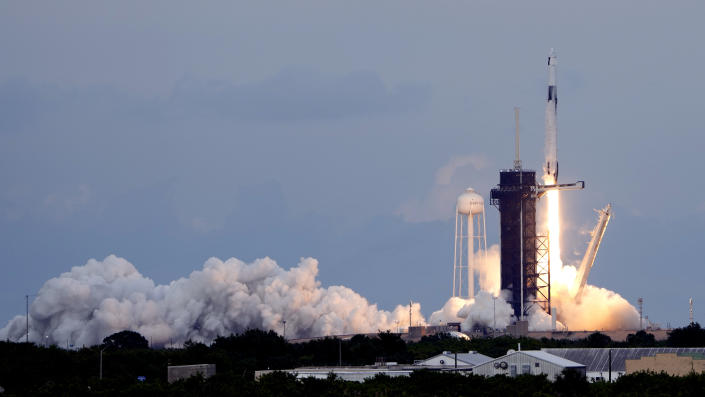
CAPE CANAVERAL, Fla. (AP) — Saudi Arabia’s first astronauts in decades rocketed toward the International Space Station on a chartered multimillion-dollar flight Sunday.
SpaceX launched the ticket-holding crew, led by a retired NASA astronaut now working for the company that arranged the trip. Also on board: a U.S. businessman who now owns a sports car racing team.
The four should reach the space station in their capsule Monday morning; they’ll spend just over a week there before returning home with a splashdown off the Florida coast.
Sponsored by the Saudi Arabian government, Rayyanah Barnawi, a stem cell researcher, became the first woman from the kingdom to go to space. She was joined by Ali al-Qarni, a fighter pilot with the Royal Saudi Air Force.
“This is a dream come true for everyone,” Barnawi said before the flight. “Just being able to understand that this is possible. If me and Ali can do it, then they can do it, too.”
“It was a phenomenal ride,” Whitson said after reaching orbit. Her crewmates clapped their hands in joy.
Axiom won’t say how much Shoffner and Saudi Arabia are paying for the planned 10-day mission. The company had previously cited a ticket price of $55 million each.
NASA’s latest price list shows per-person, per-day charges of $2,000 for food and up to $1,500 for sleeping bags and other gear. Need to get your stuff to the space station in advance? Figure roughly $10,000 per pound ($20,000 per kilogram), the same fee for trashing it afterward. Need your items back intact? Double the price.
At least the email and video links are free.
The guests will have access to most of the station as they conduct experiments, photograph Earth and chat with schoolchildren back home, demonstrating how kites fly in space when attached to a fan.
After decades of shunning space tourism, NASA now embraces it with two private missions planned a year. The Russian Space Agency has been doing it, off and on, for decades.
“Our job is to expand what we do in low-Earth orbit across the globe,” said NASA’s space station program manager Joel Montalbano.
SpaceX's first-stage booster landed back at Cape Canaveral eight minutes after liftoff, to be recycled for a future flight.
“It was a very, very exciting day,” especially seeing the booster return to the launch site, said Axiom’s chief technology officer, Matt Ondler. Now comes the rest of the mission, he noted, “all toward a path of what we think the future of low-Earth orbit is.”
___
The Associated Press Health and Science Department receives support from the Howard Hughes Medical Institute’s Science and Educational Media Group. The AP is solely responsible for all content.
Mother of 8-year-old girl who died in Border Patrol custody says pleas for hospital care were denied
The mother of an 8-year-old girl who died in Border Patrol custody said Friday that agents repeatedly ignored pleas to hospitalize her medically fragile daughter as she felt pain in her bones, struggled to breathe and was unable to walk. The girl died Wednesday on what her mother said was the family’s ninth day in Border Patrol custody. The account is almost certain to raise questions about whether the Border Patrol properly handled the situation, the second child migrant death in two weeks in U.S. government custody after a rush of illegal border crossing severely strained holding facilities.
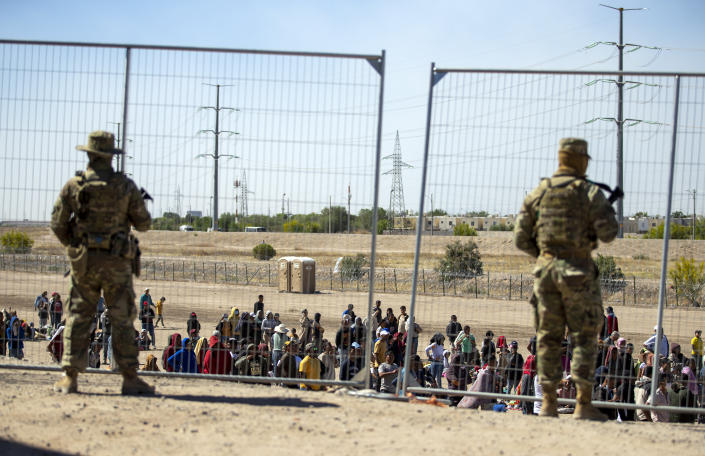
McALLEN, Texas (AP) — The mother of an 8-year-old girl who died in Border Patrol custody said Friday that agents repeatedly ignored pleas to hospitalize her medically fragile daughter as she felt pain in her bones, struggled to breathe and was unable to walk.
Agents said her daughter's diagnosis of influenza did not require hospital care, Mabel Alvarez Benedicks said in an emotional phone interview. They knew the girl had a history of heart problems and sickle cell anemia.
“They killed my daughter, because she was nearly a day and a half without being able to breathe," the mother said. "She cried and begged for her life and they ignored her. They didn’t do anything for her.
The girl died Wednesday on what her mother said was the family’s ninth day in Border Patrol custody. People are to be held no more than 72 hours under agency policy, a rule that is violated during unusually busy times.
The account is almost certain to raise questions about whether the Border Patrol properly handled the situation, the second child migrant death in two weeks in U.S. government custody after a rush of illegal border crossing severely strained holding facilities.
“No parent should have to beg for their child to get basic medical attention and be forced to watch as their child's health worsens to the point where they cannot be saved,” Jennifer Nagda, chief programs officer at the nonprofit Young Center for Immigrant Children's Rights, said in a statement Saturday.
Nagda urged the Biden administration to create “welcoming centers” at the border where immigration officials can process asylum-seeking families with children while non-governmental groups can offer food, clothing and medical care.
“The only way to stop these preventable deaths is to stop jailing families. To stop jailing children,” Nagda said.
Alvarez Benedicks, 35, said she, her husband and three children, aged 14, 12 and 8, crossed the border to Brownsville, Texas, on May 9. After a doctor diagnosed the 8-year-old, Anadith Tanay Reyes Alvarez, with influenza, the family was sent to the Harlingen station on May 14. It was unclear why the family was held so long.
Anadith woke up her first day in the Harlingen station with a fever and had a headache, according to her mother, who said the station was dusty and smelled of urine.
When she reported her daughter's bone pain to an agent, she said he responded, “'Oh, your daughter is growing up. That’s why her bones hurt. Give her water.’”
“I just looked at him,” Alvarez Benedicks said. "How would he know what to do if he’s not a doctor?”
She said a doctor told her the pain was related to influenza. She asked for an ambulance to take her daughter to the hospital for breathing difficulties but was denied.
“I felt like they didn’t believe me,” she said.
Anadith received saline fluids, a shower and fever medication to reduce her temperature, but her breathing problems persisted, her mother said, adding that a sore throat prevented her from eating and she stopped walking.
At one point, a doctor asked the parents to return if Anadith fainted, Alvarez Benedicks said. Their request for an ambulance was denied again when her blood pressure was checked Wednesday.
An ambulance was called later that day after Anadith went limp and unconscious and blood came out of her mouth, her mother said. She insists her daughter had no vital signs in the Border Patrol station before leaving for the hospital.
The family is staying at a McAllen, Texas, migrant shelter and seeking money to bring their daughter's remains to New York City, their final destination in the U.S.
Anadith, whose parents are Honduran, was born in Panama with congenital heart disease. She received surgery three years ago that her mother characterized as successful. It inspired Anadith to want to become a doctor.
Her death came a week after a 17-year-old Honduran boy, Ángel Eduardo Maradiaga Espinoza, died in U.S. Health and Human Services Department custody. He was traveling alone.
A rush to the border before pandemic-related asylum limits known as Title 42 expired brought extraordinary pressure. The Border Patrol took an average of 10,100 people a into custody a day over four days last week, compared to a daily average of 5,200 in March.
The Border Patrol had 28,717 people in custody on May 10, one day before pandemic asylum restrictions expired, which was double from two weeks earlier, according to a court filing. By Sunday, the custody count dropped 23% to 22,259, still historically high.
Custody capacity is about 17,000, according to a government document last year, and the administration has been adding temporary giant tents like one in San Diego that opened in January with room for about 500 people.
On Sunday, the average time in custody was 77 hours.
___
Associated Press writer Elliot Spagat in San Diego contributed to this report.
Mexico prosecutors withdraw case against woman sentenced to prison for killing man raping her
Mexican prosecutors announced Saturday night that they are withdrawing a case against a woman who was sentenced to six years in prison for killing a man as he raped and attacked her. In a ruling last week that touched off a public outcry, a court in Mexico State said that while it agreed 23-year-old Roxana Ruiz was raped in 2021, it found her guilty of homicide with “excessive use of legitimate defense.” It also ordered Ruiz to pay more than $16,000 in reparations to the family of her attacker.
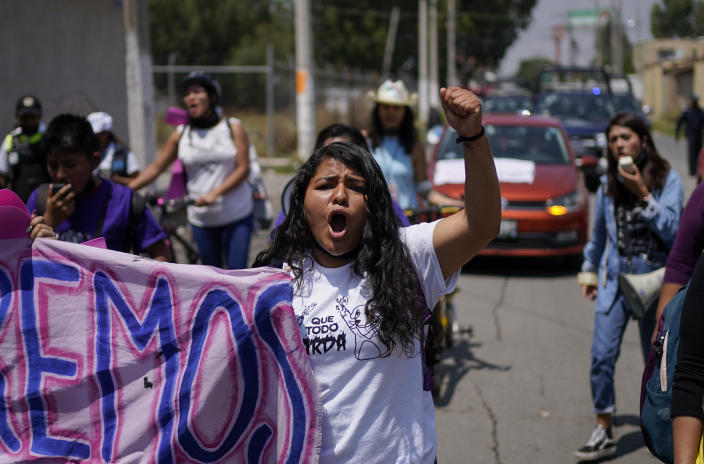
MEXICO CITY (AP) — Mexican prosecutors announced Saturday night that they are withdrawing a case against a woman who was sentenced to six years in prison for killing a man as he raped and attacked her.
In a ruling last week that touched off a public outcry, a court in Mexico State said that while it agreed 23-year-old Roxana Ruiz was raped in 2021, it found her guilty of homicide with “excessive use of legitimate defense.” It also ordered Ruiz to pay more than $16,000 in reparations to the family of her attacker.
Feminist groups, which have supported Ruiz's defense, angrily protested, saying the ruling was criminalizing survivors of sexual violence while protecting perpetrators in a country with high levels of gender-based violence and femicides. Protesters in Mexico City carried signs reading “Defending my life isn't a crime."
Ruiz, an Indigenous woman and single mother, told reporters after the court's ruling that she had received death threats because of the case and that she worried for her family's safety, particularly the life of her 4-year-old son.
“This isn’t justice,” she said. “Remember I am the one who was sexually assaulted by that man, and after he died because I defended myself … because I didn’t want to die by his hands.”
Responding to the outrage, President Andrés Manuel López Obrador had said during a morning press briefing that he would seek to pardon Ruiz. But her lawyers said accepting a pardon would be admitting Ruiz committed a crime and that she is completely innocent.
In a press release Saturday night, the state Prosecutor's Office said it had examined the case — taking into consideration that Ruiz is part of a vulnerable group — and found she was “exempt from guilt.” It added that the Prosecutor’s Office believes she acted in self defense.
The announcement was celebrated by Ruiz’s defense lawyer, Ángel Carrera, though he noted that he had not been formally notified of the charges being dropped.
“It means that they’re recognizing her innocence,” Carrera told The Associated Press. “It’s a recognition that she simply defended herself.”
In May 2021, Ruiz was working selling french fries in Nezahualcoyotl, one of the 11 municipalities in Mexico State, a state that borders Mexico City on three sides and continues to have posted alerts warning women about femicides and the forced disappearances of women.
The defense said Ruiz had a drink with a friend and a man she knew around the neighborhood. The man offered to walk her home, later asking to stay the night because it was late and he was far from home. While she slept on a separate bed, the man attacked and raped her.
Ruiz fought back and he threatened to kill her, then in the struggle, Ruiz managed to kill the man in self defense, Carrera said.
The court said the man was hit in the head and knocked unconscious, saying that was enough for Ruiz to defend herself. Carrera said that claim was “totally false,” saying it had not been determined that the attacked was rendered unconscious.
Carrera said that in a panic, Ruiz put the man’s body in a bag and dragged it out to the street, where passing police arrested her.
Despite Ruiz telling police she had been raped, a forensic exam was never done, a crucial step in prosecuting sexual violence cases, Carrera said. Instead, an officer responded that she probably wanted to have sex with the man at first and then changed her mind, the lawyer said.
Nearly half of Mexican women have experienced sexual violence in their lifetime, government data say.
In 2022, the Mexican government registered a total of 3,754 women — an average of 10 a day — who were slain, a significant jump from the year before. Only a third were investigated as femicides.
Carrera said he hopes the announcement of the case being dropped sets a precedent for other gender-based violence cases to be more thoroughly investigated and treated with deeper sensitivity.
The Associated Press does not normally identify sexual assault victims, but Ruiz has given her permission to be identified and participates in public demonstrations led by activists who support her.
___
Associated Press journalist Fernanda Pesce contributed to this report.
Ukraine's Zelenskyy at center of last day of high-level diplomacy as G7 looks to punish Russia
Zelenskyy's in-person attendance at one of the world's premier diplomatic gatherings is meant to galvanize attention on his nation's 15-month fight against Russia. Ukraine is the overwhelming focus of the summit, but the leaders of Japan, the United States, the United Kingdom, France, Germany, Canada and Italy, as well as the European Union, are also working to address global worries over climate change, AI, poverty, economic instability and nuclear proliferation.
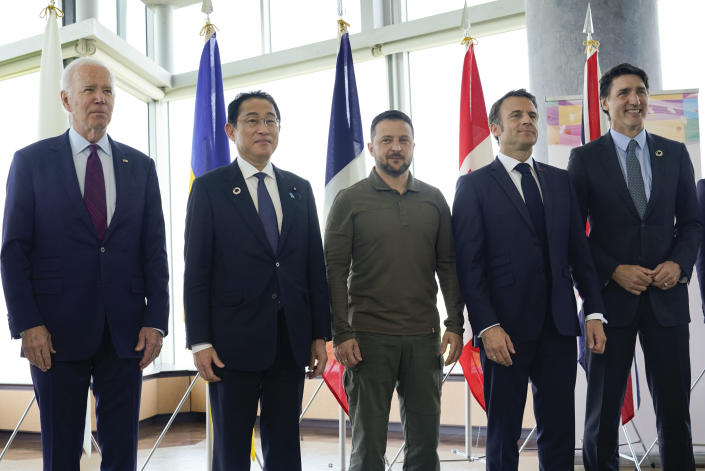
HIROSHIMA, Japan (AP) — World leaders ratcheted up pressure Sunday on Russia for its war against Ukraine, with Ukrainian President Volodymyr Zelenskyy at the center of a swirl of diplomacy on the final day of the Group of Seven summit of rich-world democracies.
Zelenskyy's in-person attendance at one of the world's premier diplomatic gatherings is meant to galvanize attention on his nation's 15-month fight against Russia. Even before he landed Saturday on a French plane, the G7 nations had unveiled a slew of new sanctions and other measures meant to punish Moscow and hamper its war-fighting abilities.
Ukraine is the overwhelming focus of the summit, but the leaders of Japan, the United States, the United Kingdom, France, Germany, Canada and Italy, as well as the European Union, are also working to address global worries over climate change, AI, poverty, economic instability and nuclear proliferation.
Two U.S. allies — South Korea and Japan — continued efforts Sunday to improve ties that have often been hurt by lingering anger over issues linked to Japan's brutal 1910-1945 colonization of the Korean Peninsula. Japanese Prime Minister Fumio Kishida and South Korean President Yoon Suk Yeol visited a memorial to Korean victims, many of them slave laborers, of the Aug. 6, 1945, atomic bombing.
Washington wants the two neighbors, both of which are liberal democracies and bulwarks of U.S. power in the region, to stand together on a host of issues, including rising aggression from China, North Korea and Russia.
“Japan. G7. Important meetings with partners and friends of Ukraine. Security and enhanced cooperation for our victory. Peace will become closer today,” Zelenskyy tweeted after his arrival.
U.S. national security adviser Jake Sullivan said that President Joe Biden and Zelenskyy would have direct engagement at the summit. On Friday, Biden announced his support for training Ukrainian pilots on U.S.-made F-16 fighter jets, a precursor to eventually providing those aircraft to Ukraine.
“It is necessary to improve (Ukraine’s) air defense capabilities, including the training of our pilots,” Zelenskyy wrote on his official Telegram channel after meeting Italian Premier Giorgia Meloni, one of a number of leaders he talked to.
Zelenskyy also met on the sidelines of the summit with Indian Prime Minister Narendra Modi, their first face-to-face talks since the war, and briefed him on Ukraine's peace plan, which calls for the withdrawal of Russian troops from the country before any negotiations.
India, the world’s largest democracy, has avoided outright condemnation of Russia’s invasion. While India maintains close ties with the United States and its Western allies, it is also a major buyer of Russian arms and oil.
Summits like the G7 are a chance for leaders to put pressure on one another to align or redouble their diplomatic efforts, according to Matthew Goodman, an economics expert at the Center for Strategic and International Studies think tank in Washington. “Zelenskyy’s presence puts some pressure on G7 leaders to deliver more — or explain to him directly why they can’t,” he said.
Russian Foreign Minister Sergey Lavrov criticized the G7 summit for aiming to isolate both China and Russia.
“The task has been set loudly and openly: to defeat Russia on the battlefield, but not to stop there, but to eliminate it as a geopolitical competitor. As a matter of fact, any other country that claims some kind of independent place in the world alignment will also be to suppress a competitor. Look at the decisions that are now being discussed and adopted in Hiroshima, at the G7 summit, and which are aimed at the double containment of Russia and China,” he said.
The G7, however, has vowed to intensify the pressure.
“Russia’s brutal war of aggression represents a threat to the whole world in breach of fundamental norms, rules and principles of the international community. We reaffirm our unwavering support for Ukraine for as long as it takes to bring a comprehensive, just and lasting peace,” the group said in a statement.
There is increasing anxiety that Beijing, which has been steadily building up its nuclear weapons program, could try to seize Taiwan by force, sparking a wider conflict. China claims the self-governing island as its own and regularly sends ships and warplanes near it.
They also urged China to pressure Russia to end the war in Ukraine and “support a comprehensive, just and lasting peace.”
China's Foreign Ministry said that “gone are the days when a handful of Western countries can just willfully meddle in other countries’ internal affairs and manipulate global affairs. We urge G7 members to ... focus on addressing the various issues they have at home, stop ganging up to form exclusive blocs, stop containing and bludgeoning other countries.”
The G7 also warned North Korea, which has been testing missiles at a torrid pace, to completely abandon its nuclear bomb ambitions, “including any further nuclear tests or launches that use ballistic missile technology," the leaders’ statement said.
The green light on F-16 training is the latest shift by the Biden administration as it moves to arm Ukraine with more advanced and lethal weaponry, following earlier decisions to send rocket launcher systems and Abrams tanks. The United States has insisted that it is sending weapons to Ukraine to defend itself and has discouraged attacks by Ukraine into Russian territory.
“We’ve reached a moment where it is time to look down the road again to say what is Ukraine going to need as part of a future force, to be able to deter and defend against Russian aggression as we go forward,” Sullivan said.
Biden’s decisions on when, how many, and who will provide the fourth-generation F-16 fighter jets will be made in the months ahead while the training is underway, Biden told leaders.
Russia had participated in some summits with the other seven countries before being removed from the then-Group of Eight after its 2014 annexation of Crimea.
The latest sanctions aimed at Russia include tighter restrictions on already-sanctioned people and firms involved in the war effort. More than 125 individuals and organizations across 20 countries have been hit with U.S. sanctions.
Kishida has twice taken leaders to visit to a peace park dedicated to the tens of thousands who died in the world’s first wartime atomic bomb detonation. Kishida, who represents Hiroshima in parliament, wants nuclear disarmament to be a major focus of discussions.
The G7 leaders also discussed efforts to strengthen the global economy and address rising prices that are squeezing families and government budgets around the world, particularly in developing countries in Africa, Asia and Latin America.
The group reiterated its aim to pull together up to $600 billion in financing for the G7’s global infrastructure development initiative, which is meant to offer countries an alternative to China’s investment dollars.
__
Associated Press writers Zeke Miller, Elaine Kurtenbach and Mari Yamaguchi in Hiroshima, Japan, and Joanna Kozlowska in London contributed to this report.
0 Likes
